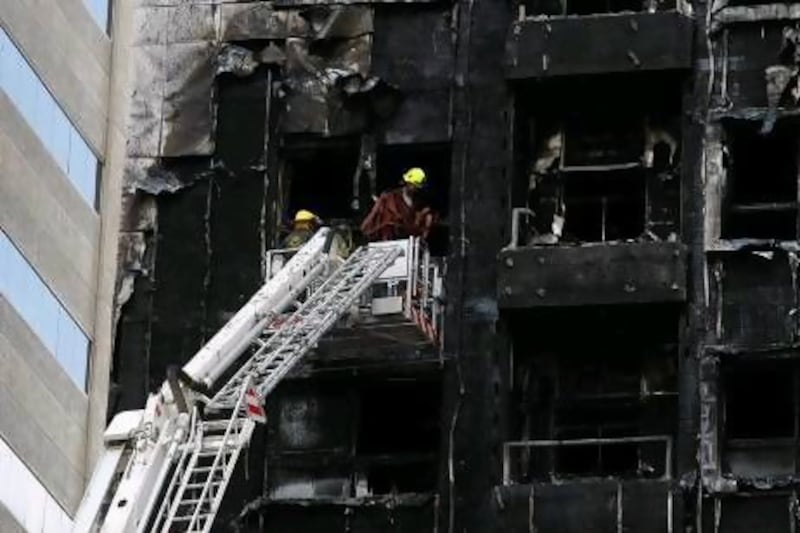DUBAI // Almost three quarters of high-rise buildings have facades made of dangerous materials, an international fire-safety consultant warns.
The facades have a combustible thermo-plastic core between two sheets of aluminium, said Thomas Bell-Wright, chief technical officer for an international consultancy.
“This is on 70 per cent of high-rise buildings in the UAE,” Mr Bell-Wright said. “I wouldn’t say it’s a ticking time bomb but it needs to be addressed.”
Assessments of towers are being carried out across the country by engineers approved by Civil Defence to check for the panelling.
The inspections could lead to recommendations on which buildings need refitting or renovation to make them compliant with fire-safety regulations.
The cladding was first discovered to be flammable in the 1980s in the UK, where it is no longer used. The safer alternative uses a mineral core and is classed as having “limited combustibility”.
“What annoys me is that the companies that manufacture this cladding know that a version of it is combustible and yet they still sell it in the UAE,” said Mr Bell-Wright.
He said inspections needed to be carried out to make sure the material did not pose a risk.
“It’s not easy to set fire to these panels but once it starts it is difficult to stop,” Mr Bell-Wright said.
“We’ve done tests and it’s very difficult to start a fire from something like a barbecue.
“However, a more common way would be if someone discarded a cigarette into a rubbish dumpster that was next to this cladding.
“The cladding could catch fire in that manner and spread up the building very quickly.”
The 40-storey Al Tayer Tower in Sharjah, which was fitted with the cladding, was destroyed by fire in April, with hundreds of families left homeless.
Investigations found it was started by a discarded cigarette. Once the cladding was ignited the fire spread quickly up the building.
Mr Bell-Wright said the more combustible cladding was cheaper and could be more easily cut into different shapes and positions.
Ziad Kassis, a project manager with Arabian Industrial in Abu Dhabi, said the company used both versions of the cladding.
“We work to the specifications of the client in terms of what they want,” Mr Kassis said. “We offer both the fire-resistant and non-fire-resistant panels and although there is isn’t much difference in the price most people tend to go with the non-resistant version.”
Although guidelines regulating the use of facades have always been part of the UAE’s Fire and Life Safety Code, a recently added clause more clearly defines what is permitted.
“It will be much more transparent and clear to the market what … will be allowed and what will not be allowed,” said Barry Bell, the managing director of Wagner Fire Safety Management Consultants in Dubai.
“Everyone involved in facades will get on the same page and there will be no excuses in the future. We are getting rid of any ambiguity.”
Mr Bell said the added clause was based on international standards.
Only systems and materials approved by Civil Defence will be allowed in any new projects. A ban on importing materials is under the municipality’s jurisdiction, Mr Bell said.
Mr Kassis said an import ban would not affect his company’s business as they already fabricate and fit the safer cladding.
“I am not aware of any new rules related to this material so if they can clarify that issue it would be good,” he said.
Brig Ahmed Al Sayegh, assistant director general of Civil Defence, said action would be taken against developers and builders not following the rules.
“Buildings must be constructed to the rules that are written down in terms of safety,” Brig Al Sayegh said.
nhanif@thenational.ae
jthomas@thenational.ae






